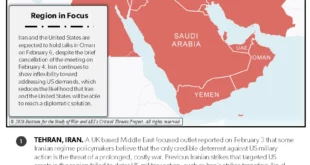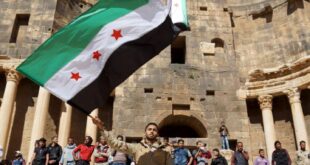BAGHDAD: Iraqi forces yesterday launched a mission to kill or capture the Al Qaeda insurgents who kidnapped 14 policemen, slit their throats and then boasted about it on the Internet.Meanwhile, in Washington, President George W Bush’s administration sacked the civilian head of the US army in a bid to quell criticism of the treatment of wounded Iraq veterans once they are flown home.
South of Baghdad, suspected members of another Sunni faction shot dead six men who dared to attend local reconciliation talks between Sunnis and Shias.
These developments came against the backdrop of massive US and Iraqi security operations in Baghdad and the western city of Ramadi, the epicentre of Iraq’s Sunni insurgency, which residents said was under siege.
Interior ministry operations director Brigadier General Abdel Karim Khalaf said that 14 officers missing after their convoy was ambushed on Thursday had been found dead in the streets of Baquba, north of Baghdad.
“The minister is following this case closely and has given the order to hunt these people down and punish them. The police chief in Baquba has collected intelligence information, and the operation is under way,†Khalaf said.
Separately, the Iraqi defence ministry announced that it had killed three “terrorists†and arrested nine more in Baquba, but it was not clear whether this was directly related to the hostage murders.
On Thursday evening, around 55 members of the Iraq’s Shia-led interior ministry forces were travelling from Baquba to the nearby town of Khalis to go on leave when they were ambushed by Sunni insurgents.
The gang managed to capture 14 of them, Khalaf said.
Shortly afterwards, a coalition of insurgent groups led by Al Qaeda said in an Internet message that the hostages would be killed to avenge the alleged rape of a Baghdad Sunni woman by Shia police.
Late on Friday, a second message said the killings had been carried out and promised that a video of the murders would be released.
Uday al-Khadran, the mayor of Khalis, said: “They were found in the streets of Baquba. Their throats had been cut and their hands were bound.â€
Prime Minister Nuri al-Maliki said the slaughter showed how deeply these “hired killers†hate the people of Iraq, and warned Sunni politicians not to exploit public anger over the rape allegation, which he branded a lie.
“We promise our people that the blood of these martyrs will not go unavenged,†he vowed.
In the village of Al-Mshahda in Yusufiyah just south of Baghdad suspected members of the Islamic Army of Iraq, a Sunni militant group linked to members of Saddam Hussain’s former regime, struck another blow against peace.
According to a defence official, gunmen from the group murdered six local men who in January had braved death threats to attend peace talks between local Shia and Sunni factions.
US and Iraqi troops were out in force in Baghdad yesterday, almost three weeks after the official start of Operation “Fardh al-Qanoon†(Imposing the Law), an ambitious drive to quell sectarian violence in the capital.
Just north of the city yesterday, US and Iraqi forces detained “nine terrorists,†including two suspected of bringing foreign extremists to Baghdad, according to US spokesman Lieutenant Colonel Chris Garver.
At least three pairs of US army Apache helicopter gunships swept in low, tight circles over the city centre firing decoy flares while troops and armoured vehicles set up checkpoints and conducted targeted raids.
In mainly Shia east Baghdad three police and a civilian bystander were injured when a roadside bomb exploded, police said.
US and Iraqi officials confirmed that this week Iraqi and American troops will build their first permanent base in the Baghdad Shia militia bastion of Sadr City, a joint security station at the edge of the slum district.
It was a similar story in Ramadi, which Al Qaeda has declared to be the capital of an “Islamic Emirate of Iraq,†where residents reported that US forces had sealed all entrances to the city.
Meanwhile, in Washington, Defence Secretary Robert Gates sacked a junior colleague, Army Secretary Francis Harvey, saying he was “disappointed†by the service’s defensive response to a scandal over the care of wounded troops.
 Eurasia Press & News
Eurasia Press & News



